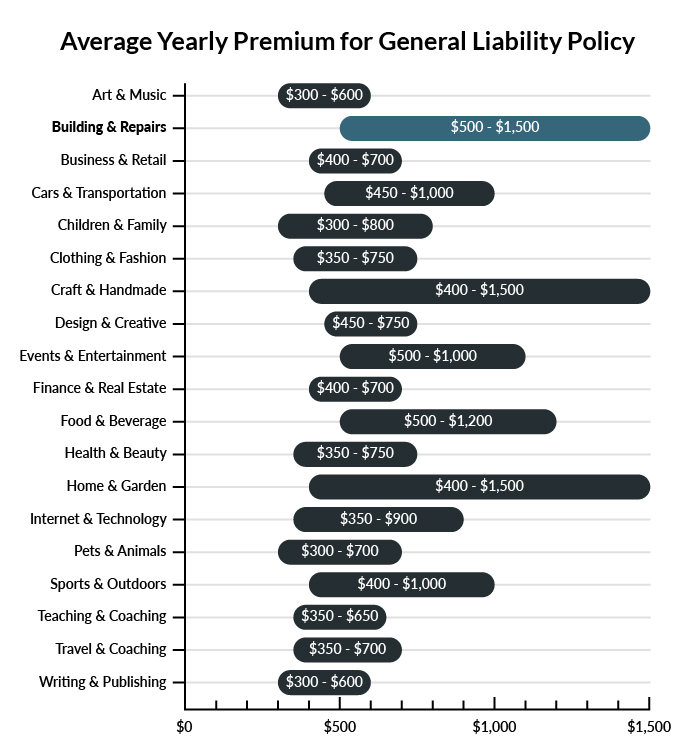Woodworking Business Insurance
Getting insurance for your woodworking business is essential.
This is because woodworking businesses need to be protected against claims involving things that could reasonably occur and cause serious financial damage, such as property damage and product liability disputes.
For example, a customer may allege that a piece of furniture they purchased was faulty or that one of your employees improperly assembled a structure that caused customer injuries.
We’ll help you find the most personalized and affordable coverage for your unique business.

Recommended: Ergo Next Insurance is dedicated to matching small businesses with the right policy at the best price.
Best Insurance for a Woodworking Business
General liability insurance is — generally speaking — one of the most important insurance policies for woodworking businesses.
Some of the risks general liability insurance covers are:
- Bodily injury
- Property damage
- Medical payments
- Legal defense and judgment
- Personal and advertising injury
Having said that, it is important to note that general liability coverage is not always enough to fully protect every woodworking business, and — depending on your specificities — you may benefit from purchasing additional policies.
Such policies include:
- Workers’ compensation will protect your business’s assets against claims that relate to your employees (e.g., wrongful termination, bodily injuries, etc.).
- Product liability will protect you from claims that arise as a result of a customer getting injured from a product purchased from your business.
- Commercial property will cover the cost of repairing and/or replacing your business’s property (e.g., inventory, furniture, etc.).
You will also need to decide what insurer you will get your coverage from; there are generally two options available for small businesses:
- Brick-and-mortar insurers
- Online insurers
Generally speaking, we recommend going for an online insurer (e.g., Tivly, Ergo Next, etc.). This is because they can offer customized coverage at a more affordable price due to the lower overhead involved (i.e., no insurance agent, etc.) and the technology they typically use, such as AI.
Let’s Find the Coverage You Need
The best insurers design exactly the coverage you need at the most affordable price.
Cost of General Liability Insurance
The average woodworker in America spends between $500-$1,500 per year for $1 million in general liability coverage.
Compare the average cost of general liability insurance for a woodworking business to other professional industries using the graph below.
Several factors will determine the price of your policy. These include your:
- Location
- Deductible
- Number of employees
- Per-occurrence limit
- General aggregate limit
You may be able to acquire general liability insurance at a discounted rate by purchasing it as part of a business owner’s policy (BOP) rather than as a standalone policy.
A BOP is a more comprehensive solution that includes multiple forms of coverage, such as business interruption and property insurance.

Find the Best Rate
Discover the best coverage at the lowest rate in our low-cost business insurance review.
Common Situations That General Liability Insurance May Cover for a Woodworking Business
Example 1: A visitor to your woodshop turns on a circular saw when you are not looking and sustains a serious injury. He decides to take legal action against your business, claiming your company is responsible for his injuries. Your general liability insurance policy will cover your legal fees while defending yourself from his claim. The policy will also pay for a settlement if the case is settled out of court.
Example 2: You are using a dolly to move supplies from your vehicle to the inside of your shop. A potential customer has arrived, and you accidentally run over her foot with the dolly. The weight of the supplies and the dolly are enough to cause a serious injury. The general liability insurance policy you have will likely cover the cost of treating her injuries.
Example 3: You find an old sign when gathering reclaimed wood. You decide the logo on the sign is perfect for your woodworking business, so you begin to use it in your marketing materials. Another business sees you using the logo and takes legal action against your business, claiming that they own the logo. Your general liability insurance policy will pay for your legal defense as well as the cost of settling out of court if you do so.
Other Types of Coverage Woodworking Businesses Need
While general liability is the most important type of insurance to have, there are several other forms of coverage you should be aware of. Below are some of the most common types of coverage:
Product Liability Insurance
All businesses that produce products that are purchased by the general public can benefit from product liability insurance. For example, a customer might purchase a bookcase from your woodworking shop. If she took the bookcase home, filled it with books, and then the bookcase fell over on her, she could sustain serious injuries. If she decided that her injuries were caused by your bookcase, she could take legal action against your business. A product liability insurance policy would pay for your legal costs when defending yourself from such a lawsuit, including the cost of paying a settlement if you settle out of court.
Commercial Property Insurance
You have invested significant funds in woodworking tools and supplies, all of which make it possible for you to operate your business. Unfortunately, there is the possibility that tragedy—such as a big fire—could strike and wipe out your equipment and supplies. The expense of replacing all of your equipment and supplies would probably be substantial—maybe too much for your business to afford. But if you have a commercial property insurance policy, then your policy would help to cover those replacement costs.
Workers’ Compensation Insurance
The state your business is located in most likely requires you to carry workers’ comp insurance if you have employees. The workers’ comp policy that you have will go a long way towards helping you protect your employees, paying for medical care to treat work-related injuries and helping to cover lost wages if employees are unable to work.
Commercial Umbrella Insurance
A commercial umbrella insurance policy is designed to take over when a general liability insurance policy leaves off. All policies have limits, and your general liability insurance policy is no exception. If you find yourself in a situation where your general liability limits are exceeded, like if you lose a big lawsuit, then your commercial umbrella policy will start paying until its limits are reached. With a commercial umbrella policy, you are not forced to pay damages out of pocket once your general liability policy is exhausted.
Additional Steps To Protect Your Business
Although it’s easy (and essential) to invest in business insurance, it shouldn’t be your only defense.
Here are several things you can do to better protect your woodworking business:
- Use legally robust contracts and other business documents. (We offer free templates for some of the most common legal forms.)
- Set up an LLC or corporation to protect your personal assets. (Visit our step-by-step guides to learn how to form an LLC or corporation in your state.)
- Stay up to date with business licensing.
- Maintain your corporate veil.
Woodworking Business Insurance FAQ
Yes, absolutely. You will need to first get a quote from an online business insurance provider like Ergo Next Insurance. Ergo Next allows you to then purchase a policy immediately and your coverage will be active within 48 hours.
A typical business owner’s policy includes general liability, business interruption, and commercial property insurance. However, BOPs are often customizable, so your agent may recommend adding professional liability, commercial auto, or other types of coverage to your package depending on your company’s needs.
“Business insurance” is a generic term used to describe many different types of coverage a business may need. General liability insurance, on the other hand, is a specific type of coverage that business owners need to protect their assets.
Yes.
You will not be able to predict when you will need your business insurance, and not having it when you need it can end up costing you thousands of dollars down the line.
For a woodworking business, we recommend getting general liability, commercial property, and product liability coverage, as well as workers’ compensation (depending on your employee structure).
Not necessarily. Certain exceptions may be written directly into your woodworking business insurance policy, and some perils may be entirely uninsurable.
Yes, an LLC is meant to create a legal barrier between your business and your personal assets and credit. If you haven’t formed an LLC yet, use our Form an LLC guide to get started.
An LLC doesn’t protect your business assets from lawsuits and liability– that’s where business insurance comes in. Business insurance helps protect your business from liability and risk.